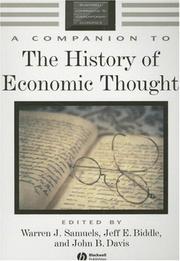| Listing 1 - 3 of 3 |
Sort by
|
Book
ISBN: 1108676650 1108679315 1108492266 1108698840 Year: 2021 Publisher: Cambridge, United Kingdom : Cambridge University Press,
Abstract | Keywords | Export | Availability | Bookmark
 Loading...
Loading...Choose an application
- Reference Manager
- EndNote
- RefWorks (Direct export to RefWorks)
The Cobb-Douglas regression, a statistical technique developed to estimate what economists called a 'production function', was introduced in the late 1920s. For several years, only economist Paul Douglas and a few collaborators used the technique, while vigorously defending it against numerous critics. By the 1950s, however, several economists beyond Douglas's circle were using the technique, and by the 1970s, Douglas's regression, and more sophisticated procedures inspired by it, had become standard parts of the empirical economist's toolkit. This volume is the story of the Cobb-Douglas regression from its introduction to its acceptance as general-purpose research tool. The story intersects with the histories of several important empirical research programs in twentieth century economics, and vividly portrays the challenges of empirical economic research during that era. Fundamentally, this work represents a case study of how a controversial, innovative research tool comes to be widely accepted by a community of scholars.
Production functions (Economic theory) --- Economics --- Economics, Mathematical --- Regression analysis --- Analysis, Regression --- Linear regression --- Regression modeling --- Multivariate analysis --- Structural equation modeling --- Mathematical economics --- Econometrics --- Mathematics --- Functions, Production (Economic theory) --- Production (Economic theory) --- History. --- Econometric models --- Methodology --- Mathematical models --- Douglas, Paul H. --- Douglas, Paul Howard, --- Douglas, Paul,
Book
ISBN: 128325591X 9786613255914 1780520077 9781780520070 1780520069 9781780520063 Year: 2011 Publisher: Bingley, U.K. Emerald
Abstract | Keywords | Export | Availability | Bookmark
 Loading...
Loading...Choose an application
- Reference Manager
- EndNote
- RefWorks (Direct export to RefWorks)
The collection includes both refereed articles and review essays. The articles highlight research on the role of western economic advisors in China before the Communist Revolution (Paul Trescott), John Ryan on minimum wage legislation, a symposium on Clement Juglar, and a comparison of recent work in the history of economics and the history of science. Review essays on new publications examine a range of subjects, including: David Humes political economy,; conceptions of economic morality in American thought; Frank Knight and the Austrians on institutions; Friedrich Engels; Austrian views on entrepreneurship; Coase and Pigou on government intervention; Hayek and conservatism; the history of the "living wage" notion; methodological consideration of economics and econometrics; and Paul Heynes essays on economic and ethics.
Economics --- History. --- Research. --- History --- E-books --- Business & Economics --- Economics. --- Economic theory & philosophy. --- General. --- Économie politique et politique --- Économie politique --- 20e siècle

ISBN: 1405134593 9781405134590 Year: 2003 Publisher: Malden : Blackwell,
Abstract | Keywords | Export | Availability | Bookmark
 Loading...
Loading...Choose an application
- Reference Manager
- EndNote
- RefWorks (Direct export to RefWorks)
Économie politique --- Économie politique --- Histoire. --- Historiographie.
| Listing 1 - 3 of 3 |
Sort by
|

 Search
Search Feedback
Feedback About UniCat
About UniCat  Help
Help News
News